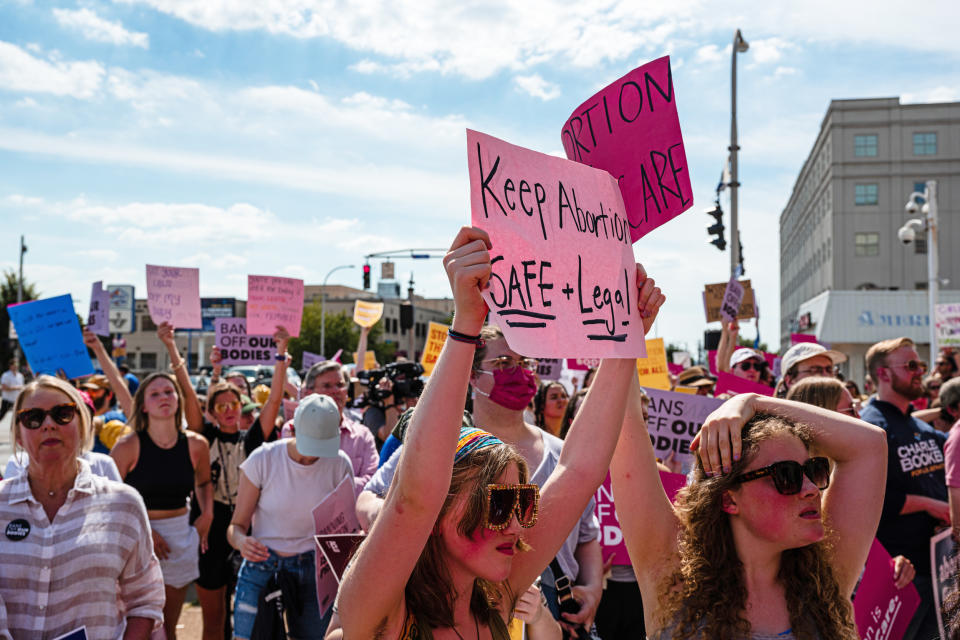Florida, Kentucky trigger laws banning abortion temporarily to be blocked by courts

Judges in Florida and Kentucky approved temporary restraining orders blocking laws that placed limits on abortions on Thursday, the latest such rulings as abortion rights advocates challenge bans state-by-state.
The moves come after judges also issued temporary halts on abortion bans in Texas, Utah and Louisiana this week.
The Supreme Court decision to overturn Roe v. Wade on Friday paved the way for two different so-called trigger laws in Kentucky — one which bans abortion outright passed in 2019 and another that outlaws abortion after a fetal heartbeat is detected. The 2019 law also makes it a class D felony to provide abortions to patients in the state.
"A Kentucky Circuit Court has blocked the state’s total abortion ban and six-week ban, granting our request for a restraining order," the ACLU of Kentucky said in a statement Thursday.
"Abortion is once again legal in the commonwealth. Our legal team is reviewing the order to determine when our client may resume care."
The suit brought forth by Planned Parenthood and EMW Women's Surgical Center, who were represented by the ACLU, argued that the laws violate the Kentucky constitution's rights to self-determination and privacy of bodily integrity.

"An individual who is required by the government to remain pregnant against her will — a significant physiological process affecting one’s health for 40 weeks and culminating in childbirth — experiences interference of the highest order with her right to possess and control her own person," the lawsuit stated.
"The right to self-determination thus protects Kentuckians’ power to control whether to continue or terminate their own pregnancy," it continued.
Planned Parenthood and EMW Women's Surgical Center are the only two clinics licensed to administer abortion in Kentucky and are represented by the American Civil Liberties Union.
Jefferson Circuit Court Judge Mitch Perry heard arguments from both the state and the ACLU.
"It's a close call, by the way," Perry said at the end of Wednesday's hearing.
Though the law states that physicians must make every effort to save both the lives of the fetus and mother, the lawsuit argues that pregnancies pose a range of dangers to a person outside of just physical complications. The complaint lists several hazards associated with pregnancy, including a higher risk of intimate partner violence, poverty and mental health issues.
The ACLU argued that forced pregnancy causes irreparable harm to Kentucky residents.
Christopher Thacker, with Kentucky's attorney general's office, argued that a restraining order was unnecessary because the parties before the court were businesses and not a Kentucky resident who may suffer harm from the law.
"None of those parties can suffer the injury of ... proposed constitutional rights because they cannot become pregnant," Thacker said.
He went on to tell the judge that there is no constitutional right to practice medicine or a constitutional right to terminating pregnancy.
In Florida, Leon County Judge Cooper will issue a temporary restraining order on a 15-week abortion ban. Cooper on Thursday called the ban a violation of the Florida constitution’s privacy provision.
“It will be a statewide temporary injunction,” Cooper said of his order. “It will only be effective when I sign an order, so it will be not today.”
Planned Parenthood and multiple other medical centers brought forth the legal complaint to stop the law, which was signed by Republican Gov. Ron DeSantis in April and was set to go into effect on Friday.
The ACLU also represented the clinics in Florida, saying in a press release Thursday that this bill would imprison doctors for providing necessary care for their patients. Daniel Tilley, legal director of the ACLU of Florida, said the ruling from Cooper "reflects the will of the people."
"Despite the efforts by Gov. Ron DeSantis and extremist Florida politicians, we have the power to fight back against these attempts to force their cruel agenda on Floridians," Tilley said. "We will continue to do so to ensure no one is forced to carry a pregnancy against their will.”
Kentucky and Florida were two of several states where such limits on pregnancy termination were ready to be put in place pending the Supreme Court’s majority opinion.
The ACLU filed another petition for relief in Ohio on Wednesday, challenging a ban on abortion after about six weeks of pregnancy, when a fetal heartbeat is detected.

